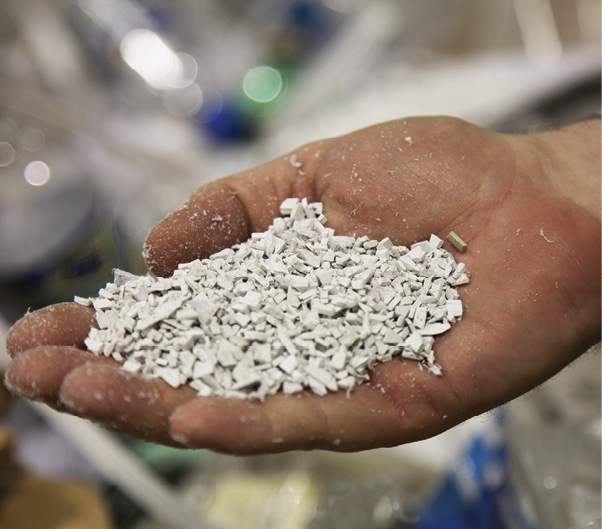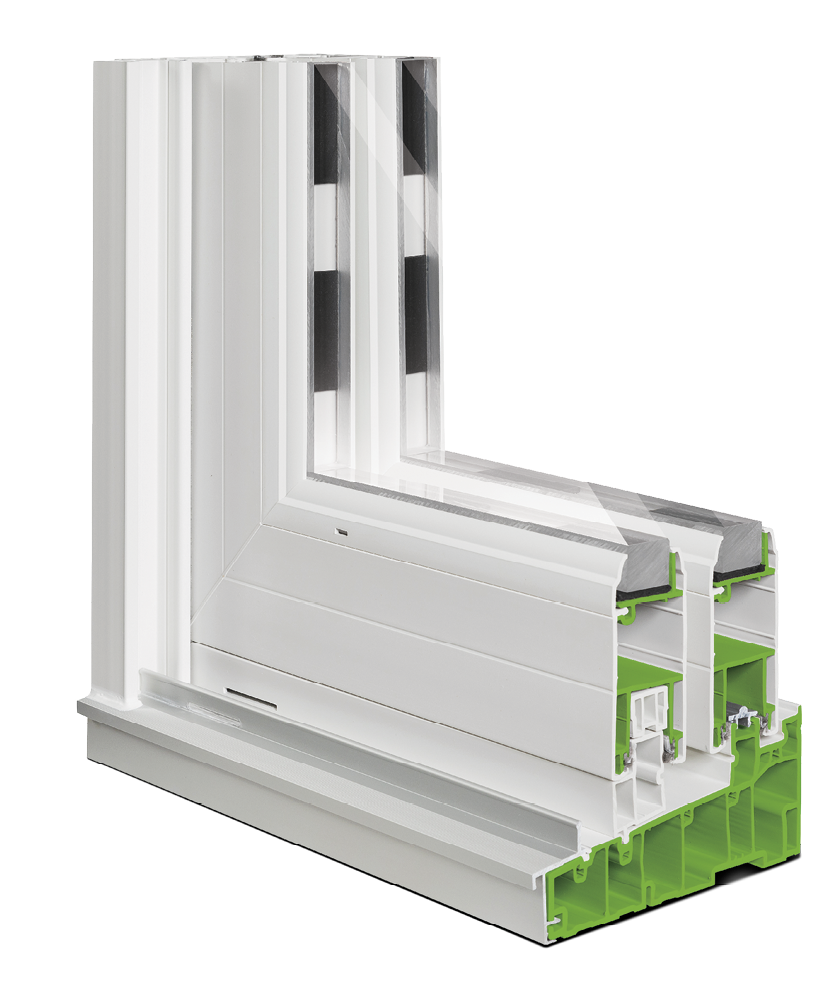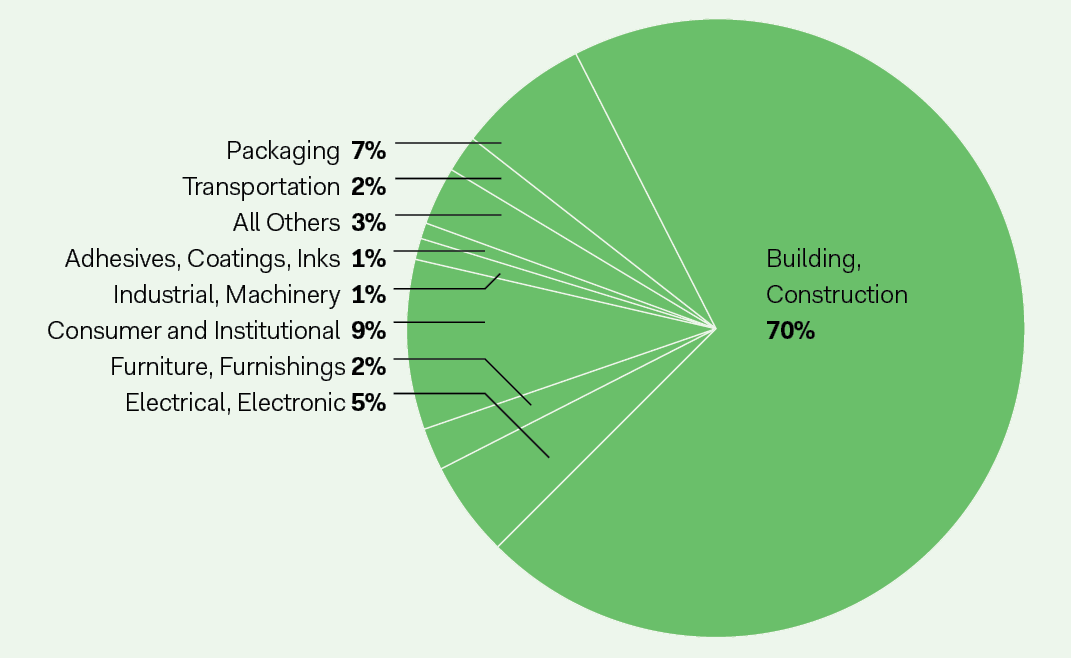Vinyl’s Green Journey
The Vinyl Sustainability Council undertakes initiatives to advance sustainability efforts across the industry

As the third most-used plastic in the world, vinyl products are used in a multitude of industries, but nowhere is vinyl as prevalent as in infrastructure. Nearly three-quarters of U.S. vinyl resin goes into the building and construction sector. Extruded windows and doors are the fourth largest end product use, according to the 2019 American Chemistry Council Resin Review. The Vinyl Institute, a trade association representing the leading U.S. vinyl resin manufacturers, calls it “the material for life.”
But the world’s finite natural resources are fleeting while the world’s population is growing. The success of the vinyl industry will be reliant on continued sustainable practices.
The vinyl industry’s sustainability journey dates back more than 40 years. It began with a focus on reducing emissions, eliminating certain heavy metal stabilizers, increasing recycling, and making other improvements to protect workers and the communities in which they live.
The importance of sustainability has since continued to grow for the industry and the world. Consumers continue to seek out sustainable products and give preference to companies that have sustainability at the forefront of their business model.

Industry-wide initiative
Recognizing this, industry stakeholders discussed how they could collaborate on this challenge, ultimately setting a clear set of priorities and forming the Vinyl Sustainability Council.
The VSC, a voluntary membership organization, serves as the collaboration platform to provide vinyl value chain members the opportunity to advance sustainability efforts across the industry.
Membership is open to any company or organization throughout the vinyl value chain, from resin producers to end-product manufacturers, retailers and recyclers.
The VSC commissioned a materiality analysis through a third party to determine industry priority areas, determined by stakeholder input and a comprehensive literature review. The exercise identified three impact categories the industry should focus on:
- Expanding the industry’s successes in resource efficiency, including recycling
- Reducing emissions to protect the environment
- Ensuring the safety of the 350,000 workers in the nearly 3,000 communities they serve.
These three impact categories align with three of the United Nations Sustainable Development Goals: clean water and sanitation; industry, innovation and infrastructure; and responsible consumption and production.
But sustainable practices mean little if there isn’t accountability to track performance. As such, VSC introduced +Vantage Vinyl in 2018, a voluntary effort by VSC member companies through which industry and company commitments are set, measured and reported on.
Participating companies must commit to completing activities that contribute to impact categories. Third-party certification body GreenCircle Certified LLC annually verifies +Vantage Vinyl participants through achievement of KPIs. Verified companies can use the +Vantage Vinyl trademark to communicate their commitment to sustainability to their customers.
+Vantage Vinyl participants report abundant value in committing to the initiative. For Formosa Plastics Corporation, it emphasizes the meaning of sustainable development through common core principles. GEON Performance Solutions uses the program as an opportunity to demonstrate leadership and innovation in sustainability in the industry and build a reputation as a responsible corporate citizen. And Sika Corporation – Roofing says +Vantage Vinyl provides the opportunity to assess their progress against sustainability initiatives, highlight their accomplishments and develop a path for continuous improvement.
With clear benchmarks for each of the three impact categories, the VSC plans to announce the next set of industry commitments and targets for the industry in the first quarter of 2021.

Vinyl recycling
Environmental stewardship is at the core of how vinyl value chain members do business. For example, the U.S. vinyl industry’s air emissions have decreased by 84 percent since 1987, while overall production of resin has increased by 99 percent over the same period.
It’s also important to note that vinyl is recyclable, and with the help of product manufacturers and more than 100 recycling facilities, the vinyl industry recycles over 1 billion pounds of vinyl materials annually in the U.S. and Canada.
One way the vinyl industry has improved recycling rates is through take-back programs. Product manufacturers, including Tarkett and Sika, have robust recycling programs that collect materials at the end of their lifecycle and reincorporate them into new, recycled products.
The residential fenestration market
Window and door manufacturers are also seeking out more sustainable solutions and are considering additional recycling methods.
“For many years American Architectural Manufacturing Association (AAMA)-certified profiles were always allowed to use recycled pre-consumer profiles and cutoffs of the same compound,” says Kevin Seiling, Veka’s VP of engineering and first vice president of the Fenestration and Glazing Industry Alliance Vinyl Materials Council. “In the past year, we added the option to recycle known pre-consumer AAMA-certified compounds as long as they are capped with the extruders’ AAMA-certified compound. All other scrap that is not an acceptable color match or a mix of PVC caps, acrylic caps and other contaminants are recycled down one level into capped profiles such as fence and railing.”
Additionally, P.H. Tech recently introduced an eco-friendly patio door made from recycled PVC. “The doors, which are made through Nucleus technology, also adhere to the high AAMA/FGIA standards,” says Philippe Hurez, P.H. Tech project manager. Hurez explains the door is deliberately made with a light gray color to showcase its recycled profile.
